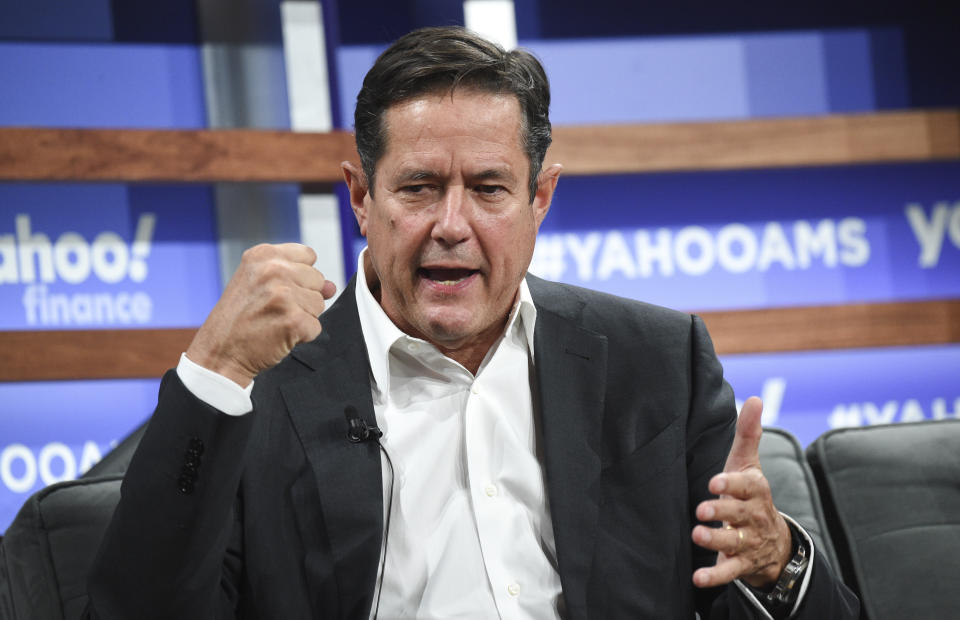Barclays CEO Jes Staley on his bank's stock: 'It's undervalued'
Over the past five years as the global economy has continued to recover from the Great Recession, shares of the British lender Barclays (BCS) have plummeted over 40%.
“Oh, it’s undervalued,” Barclays CEO Jes Staley said of his bank’s stock price. “I’m happy to say that.”
On Thursday, Staley told Yahoo Finance Editor-in-Chief Andy Serwer at the All Markets Summit that he found pressure on the stock “deeply frustrating,” citing three causes for its poor performance: Brexit, low interest rates, and lingering regulatory measures that stemmed from the financial crisis.
Explaining first how Brexit has hurt Barclays’ stock price, Staley said it boils down to risk.
“There is the uncertainty of Brexit,” he said. “If you're an investor, why buy a UK stock today? You wait until the uncertainty of Brexit is over.”
Staley acknowledged that such resolution may not come anytime soon, calling the political dispute over Brexit a “massive stalemate.”
“You've got a crisis because there's no constitution,” he adds. “The political architecture in the UK is really one that's evolved over centuries. And there is no rulebook.”
On Friday, the European Union and the United Kingdom agreed to “intensify” Brexit talks in the coming days, according to the European Commission. But United Kingdom Prime Minister Boris Johnson said that the two sides have “a way to go” before they can strike a deal.
Low interest rates across Europe have put additional pressure on Barclays stock, Staley said.
“Interest rates in Europe are extremely low,” he says. “If you're a bank and interest rates are basically hitting zero or or negative, it puts pressure on you. And that's why virtually every European bank is trading below its book value.”

Lingering regulatory effects in the United Kingdom, which stemmed from the financial crisis, comprise the third reason why Barclays stock has struggled, Staley said.
“The U.S. regulatory response was to basically hit the banks all at once, and the recapitalization and recalibration of risk for the U.S. banks was basically done by 2010,” he says. “And everyone believes, now, that the Federal Reserve and the U.S. Treasury is done recapitalizing and recalibration risks for the banks. They don't have that conviction about the European regulators nor the Bank of England.”
Staley cited IFRS 9, a reporting standard put in place by the International Accounting Standards Board after the financial crisis that requires banks to meet benchmarks aimed to reduce exposure. Last year, the International Accounting Standards Board announced it would delay until 2022 the implementation of a related standard, IFRS 17, which applies to insurance contracts.
“The European regulators felt that they would bleed, over time, the new recalibration of risk called IFRS 9 and the recapitalization over a period of time, even going out to 2022,” he adds. “You know, it doesn't work that way. If an investor sees that something may happen in 2022, they discount what it means today with uncertainty.”
In contrast with Barclay’s stock dip over the past five years, shares in Goldman Sachs (GS) have increased more than 16% over that period, and JPMorgan Chase (JPM) has spiked over 108%.
Some banks, like United Kingdom-based bank HSBC, have seen stock struggles similar to those of Barclays. HSBC (HSBC) shares have fallen more than 23% over the past five years, due in part to the pressures that Staley described.
Staley became the chief executive at Barclays in 2015, when he left a position as managing partner at BlueMountain Capital. He has faced some notable challenges during his tenure, including a fine for his effort to unmask a company whistleblower as well as the arrival and ongoing criticism of activist investor Edward Bramson.
In the second quarter, Barclays reported $1.23 billion in net income attributable to equity holders, a year-over-year decline of 19%. The bank reportedly made cuts last month to its global workforce in an effort to offset losses in its markets division.
Staley appeared frustrated that the company’s stock performance has not mirrored what he described as a recent string of business success.
“In the first six months of the year, we had the most profitable statutory first six months that this bank has had since the financial crisis,” he says. “We've tripled the dividend in the last two years. We have the highest dividend rate since we have had since the financial crisis, and the stock's under pressure.”
Watch Barclays CEO Jes Staley’s full interview at the Yahoo Finance All Markets Summit below:
Max Zahn is a reporter for Yahoo Finance. Find him on twitter @MaxZahn_.
Read more:

 Yahoo Finance
Yahoo Finance 

